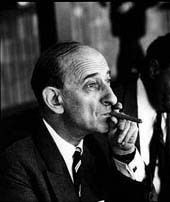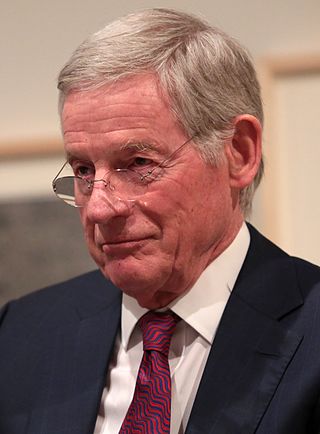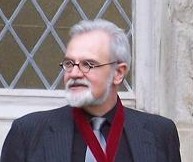Related Research Articles

Alexis Charles Henri Clérel, comte de Tocqueville, was a French aristocrat, diplomat, sociologist, political scientist, political philosopher, and historian. He is best known for his works Democracy in America and The Old Regime and the Revolution (1856). In both, he analyzed the living standards and social conditions of individuals as well as their relationship to the market and state in Western societies. Democracy in America was published after Tocqueville's travels in the United States and is today considered an early work of sociology and political science.

Henri-Benjamin Constant de Rebecque, or simply Benjamin Constant, was a Swiss political thinker, activist and writer on political theory and religion.

Raymond Claude Ferdinand Aron was a French philosopher, sociologist, political scientist, historian and journalist, one of France's most prominent thinkers of the 20th century.
The Graduate School and University Center of the City University of New York is a public research institution and postgraduate university in New York City. Formed in 1961 as Division of Graduate Studies at City University of New York, it was renamed to Graduate School and University Center in 1969. Serving as the principal doctorate-granting institution of the City University of New York (CUNY) system, CUNY Graduate Center is classified among "R1: Doctoral Universities – Very High Research Activity".

Harvey Claflin Mansfield Jr. is an American political philosopher. He was the William R. Kenan Jr. Professor of Government at Harvard University, where taught from 1962 until his retirement in 2023. He has held Guggenheim and NEH Fellowships and has been a Fellow at the National Humanities Center. In 2004, he was awarded the National Humanities Medal by President George W. Bush and delivered the Jefferson Lecture in 2007.

Sir Larry Alan Siedentop was an American-born British political philosopher with a special interest in 19th-century French liberalism. He was the author of Democracy in Europe (2000) and Inventing the Individual (2014) and an occasional contributor to several major British daily newspapers, including the Financial Times and The Times.
Eloise Quiñones Keber was Professor Emeritus of Art History at Baruch College and The Graduate Center, CUNY, where she specialized in Pre-Columbian and early colonial Latin American art. She earned her Ph.D from Columbia University in 1984.

Noël Carroll is an American philosopher considered to be one of the leading figures in contemporary philosophy of art. Although Carroll is best known for his work in the philosophy of film, he has also published journalism, works on philosophy of art generally, theory of media, and also philosophy of history. As of 2012, he is a distinguished professor of philosophy at the CUNY Graduate Center.

John Patrick Diggins was an American professor of history at the University of California, Irvine, Princeton University, and the City University of New York Graduate Center.
Liberalism is a political and moral philosophy based on the rights of the individual, liberty, consent of the governed, political equality, right to private property and equality before the law. Liberals espouse various and often mutually warring views depending on their understanding of these principles but generally support private property, market economies, individual rights, liberal democracy, secularism, rule of law, economic and political freedom, freedom of speech, freedom of the press, freedom of assembly, and freedom of religion. Liberalism is frequently cited as the dominant ideology of modern history.
James T. Kloppenberg is an American historian, and Charles Warren Professor of American History, at Harvard University.
Susan Buck-Morss (1942) is an American philosopher, visual theorist, and intellectual historian.
Judith Stein was an American historian, and a Distinguished Professor of History at the City College and Graduate Center of the City University of New York. She worked on African American history, social movements, labor and business history, and political economy. Her major works are World of Marcus Garvey: Race and Class in Modern Society, Running Steel, Running America: Race, Economy and the Decline of Liberalism, and Pivotal Decade: How the United States Traded Factories for Finance.
Barbara Caine is an Australian feminist historian.
Merle Dorothy Rosenblatt Goldman was an American historian and sinologist of modern China. She was professor of history at Boston University, especially known for a series of studies on the role of intellectuals under the rule of Mao Zedong and on the possibilities for democracy and political rights in present-day China.
Carol C. Gould is an American philosopher and feminist theorist. Since 2009, she has taught at City University of New York, where she is currently Distinguished Professor of Philosophy at Hunter College, and in the Doctoral Programs of Philosophy and Political Science at the CUNY Graduate Center, where she is Director of the Center for Global Ethics and Politics at the Ralph Bunche Institute. Gould is also editor-in-chief of the Journal of Social Philosophy. Her 2004 book Globalizing Democracy and Human Rights received the 2009 David Easton Award which is given by the American Political Science Association "for a book that broadens the horizons of contemporary political science." Her 2014 book Interactive Democracy: The Social Roots of Global Justice received the 2015 Joseph B. Gittler Award from the American Philosophical Association for "an outstanding scholarly contribution in the field of the philosophy of one or more of the social sciences."
Annabel M. Patterson is the Sterling Professor Emeritus of English at Yale University.
Susan Laura Mizruchi is professor of English literature and the William Arrowsmith Professor in the Humanities at Boston University. Her research interests include nineteenth- and twentieth-century American literature, religion and culture, literary and social theory, literary history, history of the social sciences, and American and Global Film and TV. Since 2016, she has served as the director of the Boston University Center for the Humanities.
Sarah B. Pomeroy is an American Professor of Classics.

Irena Grudzińska-Gross is a Polish historian. After fleeing from her native Poland as a university student following the 1968 Polish political crisis, she obtained her PhD at the Columbia University and became a professor at Emory University and Boston University, as well as a resident scholar at Remarque Institute and Princeton University. A 2018 Guggenheim Fellow in Intellectual and Cultural History, she has written historical books on modern Europe, including The Scar of Revolution (1991), Czeslaw Milosz and Joseph Brodsky: Fellowship of Poets (2009), and Golden Harvest (2011), the latter of which she co-wrote with her ex-husband Jan T. Gross.
References
- ↑ "Herman Bennett and Helena Rosenblatt Named Distinguished Professors, Highest Academic Honor at CUNY". www.gc.cuny.edu.
- ↑ "Rosenblatt, Helena". www.gc.cuny.edu.
- ↑ "Editorial Board | The Tocqueville Review".
- ↑ "Global Intellectual History". Taylor & Francis.
- ↑ "The Best of Books 2018". December 14, 2018.
- ↑ Corroto, Paula (June 25, 2020). "Los 10 mejores libros de historia recién publicados: pestes, mitos, romanos..." elconfidencial.com.
- ↑ Vogt, Justin (September 14, 2018). "Modern Political Ideas" – via NYTimes.com.
- ↑ "The Thought Project - Episode 30 - Interview with Helena Rosenblatt" – via soundcloud.com.
- ↑ Bell, David A. "The Many Lives of Liberalism | David A. Bell" – via www.nybooks.com.
- ↑ "Helena Rosenblatt". John Simon Guggenheim Memorial Foundation...
- ↑ "Helena Rosenblatt, 2000–2001". National Humanities Center.
- ↑ "Jean-Marie Roulin, lauréat du Prix " Benjamin Constant " (Lausanne)". www.univ-st-etienne.fr. October 19, 2018.